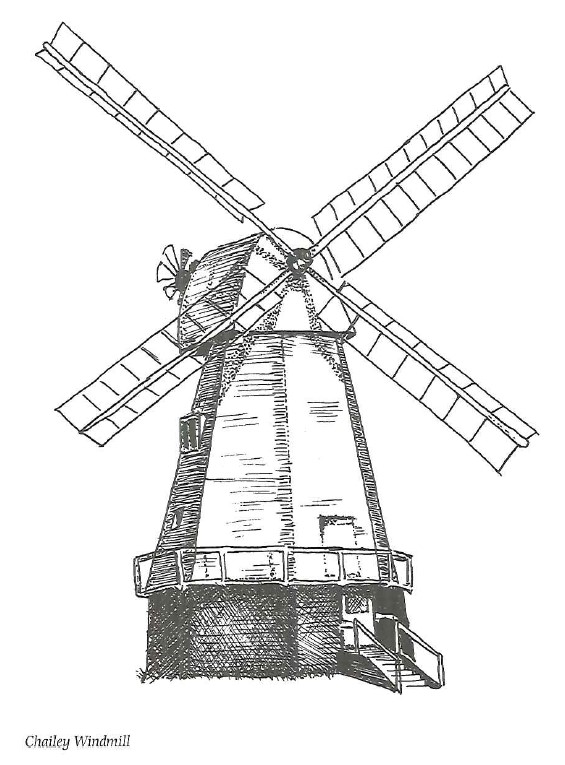Smuggling was once a booming business in this idyllic Downland village, with most of the inhabitants, including the vicars, taking part. The valleys, hollows and high beacons were ideal for those involved in bringing in the contraband from the stretch of coastline between Birling Gap and Cuckmere Haven, and Jevington itself seems to have once had a veritable warren of secret passages and hiding places.
Several led from the pub, The Eight Bells, where Jevington Jigg, cornerstone of the smuggling operations, was the keeper. Also known as Jack Jigg, James or John Pettit, Wilson, Morgan, Gibbs and Williams to name but a few, he was the crony of Brook (the horse thief), Howell (the tailor), Rook (the highwayman) and Cream Pot Tom (who met his end at the gallows).
The nocturnal activities of Jevington Jigg soon brought him to the notice of the authorities and in 1788 a body of armed constables went to the inn for the purpose of arresting a fellow belonging thereto, whose notorious profligacy and desperate deportment made every precaution necessary to ensure success in attempting to secure his person’. Jigg was playing cards with his friends and on hearing that the inn was surrounded quickly donned a bonnet, cloak, petticoat and spurred boots. He burst outside pretending to have hysterics and made good his escape.
His chequered career kept him in trouble with the law for years but at one point he seems to have been a poacher turned gamekeeper, working for a while with the excise men as a noncommissioned guardian of the revenues. Jigg’s pals obviously thought he was an informer and he narrowly evaded a lynch mob.
He could never entirely forget his old habits. He got away with charges of assault and hay stealing and returned to his old haunts after serving part of a seven-year transportation sentence for stealing two hams from one Smith of Jevington. Finally in the summer of 1799 he was convicted of horse stealing at Salisbury and condemned to death. The sentence was transmuted to 14 years at Botany Bay and there, in all probability, he died.
From the time of William Carr in 1670 until the 19th century it seems the ‘smuggling parsons’ co-operated with what was going on, no doubt to their advantage, and the rectory cellars were so enormous that they could not have been built for anything except the storage of smuggled goods. Among the clergymen who turned a blind eye or actively participated in the illicit goings on was Nat Collier whose curious monument in the church of St Andrew says he died on
March 1, 169%. Simon Manningham, vicar of Jevington from 1734 to 1767, appears to have spoken out against the smuggling racket, a breaking of tradition which caused the clergyman and his flock to drift apart. Manningham wrote the following warning for the man who would take his place: August 1754. Look out sharp O my successor, for your parishioners will cheat you wherever they can, neither provoke ’em to anger nor invite ’em to be intimate. My successor if he will not suffer himself to be cheated (as I, poor I, have done) will make of this living above an hundred and fifty pounds a year – S. Manningham.’
The memory of the village’s past lingered on into the 20th century, when a handbook to the district published in 1901 noted that a game called “smuggling’ was still popular with local children.
One hapless rector had other things on his mind when the church was presented with a mechanical organ which only played one tune, Old Hundredth, to which the congregation sang all their psalms. One particular Sunday, after completing Old Hundredth, the organ suddenly went into a lively air called Little Drops of Brandy. Frantic efforts to stop it were unsuccessful and the story goes that the rector ran down the lane with the organ still playing in his arms and threw it down the village well.
The same well has a more eerie tale, with the ghostly wails of children said to come from it, and somewhere in Jevington is the Butcher’s Hole where the butcher buried his wife after murdering her.
The thorough restoration at the church in 1873 upset the lovers of architecture, with nothing left to be viewed in complete originality in a building dating from Saxon times, and the church bells were carted away to London to be sold. This spawned the jingle:
“Jevington folk are very proud people, They sold their bells to mend the steeple, And before they are left in the lurch, They would sell the steeple to mend the church.”
The village once had a monastery in the fields west of the church, but all remains of the building have long since vanished. A court case provides concrete evidence that it was still in existence in 1344. The Prior of Michelham brought action against Adam Elyot, Robert Tut, Thomas Chesham and Robert Qurk for breaking into the Prior’s building at Jevington by force of arms, viz: ‘Swords, bows, arrows and axes and taking away timber to the value of £20 and committing other enormities against the said Prior.’ The defendants denied the charge of breaking in, saying the doors had been open, and put the value of the timber at 12d. The verdict, unfortunately, has not been recorded for posterity.
